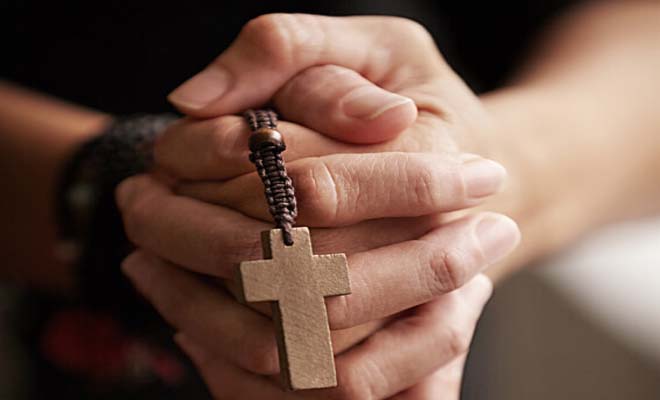
In the Divine Liturgy, and also in every holy Service of our Church, the most frequent prayer we hear to God is “Lord, have mercy.” Every petition offered by the celebrant, whether it is at the start of the Divine Liturgy, the Vespers, Matins, or all Services, ends with the words “...let us pray to the Lord”- and the people respond with “Lord, have mercy.” Where the Sacred Mysteries are offered, this is done. It is the same with the other petitions, which begin with “We also pray for…” The people respond with “Lord, have mercy,” sometimes only once, but it can be three times, twelve times, or even forty times!
What does “have mercy” mean here? The word “mercy” (in Greek éleos) means having a sense of sympathy and compassion for the suffering of others. We see their needs and pain, and we are moved to help them. The mercy of Our Lord Jesus Christ is its ultimate expression, as we know from the Holy Gospels. So every time “Lord, have mercy” is said, what we are doing is approaching the Lord in humility to ask for His mercy, this supreme compassion, and to provide for us what we need. This is not something we are demanding, but rather begging for, with the certainty that He, as “good and man-loving God,” will hear us and respond appropriately.
Why, also, did the Church establish the practice of repeating “Lord, have mercy” so many times during our common worship services?
Let us remember that this was the way in which many people cried out to the Lord. The sick, the blind, disabled ones, and those with leprosy called our Lord Jesus Christ as He was making tours around the cities and villages of Palestine. With few words (“have mercy on me!”), they drew the Lord’s attention and with compassion, He came to them with healing (see Matthew 15:22-28; 17:15-18; Mark 10:47-52; Luke 17:13-14). What this demonstrates is that when this petition is said with faith and a sincere heart (rather than simply recited), it has tremendous power.
As for the frequency of “Lord, have mercy,” as it is used in our churches, it is important to keep in mind what the Divine Liturgy is. It is not the priest and/or Bishop doing it alone, with the faithful just there as spectators, like a performance. The word Liturgy is a composite word meaning “work of the people.” In other words, the Divine Liturgy is celebrated along with the people, and for the sake of the people. The laity actively participate in the Divine Liturgy, and the priest is not able to celebrate the Divine Liturgy without them. This can be seen in the Liturgy itself, where everything that the celebrant says is answered by the people. When the priest ends a prayer, the people respond with Amen! Or the priest says, “Peace be unto you,” and the people respond, “And with your spirit.” A more specific example, is when the Deacon or Priest says “For the peace from above and for the salvation of our souls, let us pray to the Lord.” This prayer is him urging the people to pray for God’s peace and for the salvation of their souls. The faithful, instead of just repeating the petition, respond with three words: “Lord, have mercy.” In this way, the people are asking God to act according to His mercy and compassion, to grant His peace and save their souls. This is then repeated at the end of all relevant petitions, and when “Lord, have mercy” is chanted by the chanter (acting as representative of the people), every Christian must also say it with their hearts. That is how Christians participate in the common worship, in an essential and meaningful way, while profiting spiritually from it.
This is a key point to pay attention to, because there is a danger of letting “Lord, have mercy” be neglected due to the frequency of its repetition.
The Church makes extensive use of this short prayer, as the Holy Gospels record the many miracles that took place with a “Lord, have mercy.” This prayer is not only for the services in our Church, but in the private lives of the faithful. The Holy Fathers of the Church have passed down to us the short Prayer: “Lord Jesus Christ, have mercy on me.” The sole petition here is “have mercy on me.” This is the Prayer that Orthodox monks and nuns have in their mouths and hearts constantly, which is how they are able to more easily follow St. Paul the Apostle’s exhortation to pray without ceasing” (1 Thessalonians 5:17). Not only can monastics do this, but every pious Christian who has a deep love for Christ, and wants to keep Him in their minds and hearts always. In this way, they can always communicate with the Lord. St. Porphyrios used to advise us: When you say the prayer “Lord Jesus Christ, have mercy on me,” repeat it slowly, humbly, softly, wholeheartedly, and with passionate divine love.
My dear brothers and sisters, we often make the excuse that we never have time to pray. However, if we love Christ, feel His presence in our hearts and desire to communicate with Him often, then this short prayer is the solution to such difficulties. There is no need to spend a lot of time, just a few seconds. We can say the Prayer with our lips and more importantly, with our hearts, in an inner way, whenever we can and wherever we find ourselves. Let us try to do this, all of us, and our lives will become blessed. Let us intensify the Prayer. “Lord Jesus Christ, have mercy on me”
-especially in difficult moments- with faith and devotion to our Lord. Wonderful things will happen as a result. Amen.





